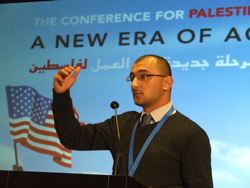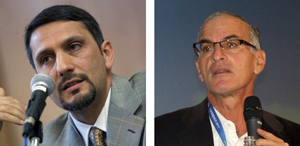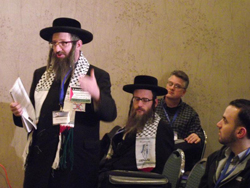Activists continue fight for justice for the Palestinian people
By Ashahed M. Muhammad -Asst. Editor- | Last updated: Dec 8, 2011 - 1:39:59 PMWhat's your opinion on this article?
Empowerment through education and action

Taher Herzallah, one of the “Irvine 11,” a group of students arrested for protesting a speech by Israeli
Ambassador to the U.S. Michael Oren in 2010, talks about activism and remaining strong in the face
of adversity Nov. 25.
|
The three-day gathering themed, “The Conference for Palestine in the U.S.: A New Era of Activism” equipped attendees with important information, especially at this critical stage of the movement when it appears the long-time goals of ending the Israeli occupation and achieving Palestinian statehood are within reach. (See related article.)
“Israel’s occupation of Palestine is the longest-lasting occupation in modern history—and it is supported by the United States financially, politically and diplomatically,” said Dr. Hatem Bazian, AMP national chairman and professor of Near Eastern and Ethnic Studies at University of California, Berkeley. “This conference is designed to educate people and then empower them to take action,” he added.

(l)Dr. Hatem Bazian, AMP national chairman (r)Dr. Norman G. Finkelstein speaks during the panel
“Zionism and the Roots of the Confl ict” Nov. 26. Photos Courtesy: American Muslims for Palestine
|
A session titled “Criminalizing Palestine in the U.S.” explored civil liberties for Muslims in the context of 9/11 and the so-called “War on Terror.” Strategies to combat the well-orchestrated and heavily financed Islamophobic crusade spreading across the United States and Europe were also outlined.
In a concurrent Campus Activism Track, organizers from colleges and universities across the U.S. discussed media outreach strategies and new developments in the very effective “Boycott, Divestment, and Sanctions” movement sweeping the country. One particularly active group—Students for Justice in Palestine—exists on nearly 130 college campuses across America. Anna Baltzer, national organizer for the U.S. Campaign to End the Israeli Occupation, and journalist Max Blumenthal shared their experienced guidance with the young students in attendance.
In a particularly poignant moment during the opening plenary session, Archbishop Atallah Hanna, of the Orthodox Patriarchate of Jerusalem delivered a special gift to the AMP. He unfurled panoramic photographs of Jerusalem that included Al-Aqsa mosque compound and the Church of the Holy Sepulchre.

Members of Anti-Zionist Orthodox Jewish Naturei Karta International were also on hand to show their
support for the Palestinian people.
|
Other speakers throughout the three-day conference were Sheikh Jamal Said of the Mosque Foundation in Bridgeview, Sheikh Amin Al-Ali of the Islamic Community Center of Illinois; Dr. Zaher Sahloul, chairman of the Council of Islamic Organization of Greater Chicago; Safaa Zarzour, secretary general of the Islamic Society of North America; and Khalil Meek, executive director of the Muslim Legal Fund of America.
Dr. Norman Finkelstein participated in two lively panel discussions and is currently working on a book dealing with the various reasons why in his opinion, the “American Jewish love affair with Israel is coming to an end.” Alison Weir, president of the Washington D.C.-based advocacy group Council for the National Interest participated in a panel discussion and took time to speak with many attendees arming them with information needed to better understand the economic realities and diminished moral standing caused by America’s symbiotic relationship with Israel.
In just four years, the AMP has grown from a small yet committed group of volunteers into one of the country’s leading organizations working for the cause of justice for Palestinians. With 13 chapters and a budget of nearly $800,000, AMP national vice-president and conference chairman Munjed Ahmad told The Final Call much has been accomplished and the tide appears to be turning, however, there is still much more to do in the way of education and advocacy regarding Palestine.
“There’s no question that we are seeing a shift in the issue of Palestine. We’re seeing a shift from people who may have been turning a blind eye to the cause of Palestine to them now shifting and starting to say we have to speak truth to power; we have to start seeing justice for the Palestinians,” said Mr. Ahmad. “I think the world realizes that the Palestinian issue is really truly the single most volatile issue in the world right now and it’s an issue that’s not going to go away. The Palestinian people have shown their steadfastness, have shown their ability to be patient and have shown their ability to continue their fight for freedom and now the world is starting to stand up and say ‘you know what they deserve it and they’re going to get it.’ It’s a matter of time. I think in this country alone we’re starting to see a shift in the way people think of the issue and in time—we don’t know how long—but with God’s help, in time, the Palestinian people will be free and they will be holding their heads high for this steadfastness,” he added.
The final session of the conference featured Imam Zaid Shakir, co-founder of Zaytuna College. Thousands of booklets, brochures and fact sheets were distributed aimed at countering the misinformation circulated by pro-Israel organizations. The AMP’s research division released a new publication titled “The Anti-Defamation League: A Protector of Civil Rights or Silencer of Free Speech?” Hundreds were distributed to those in attendance and for later distribution through student organizations.
“The ADL was founded in 1913 to fight anti-Semitism in the United States, which is a laudable goal,” said Kristin Szremski, AMP director of media and communications, “but there have been so many examples throughout its history—especially under the long-time directorship of Abraham Foxman—where it has used its vast resources to intimidate Americans and stifle their constitutionally protected right of free speech.”
Mr. Ahmad agreed saying dissemination of factual data is critical in the fight for Palestinian justice.
“We’ve been dealing of course quite a bit with the other side and they’ve been around for much longer than we have. They’re obviously much more well-funded then we are. The amount of money that they spend in one month probably equals our entire budget for the entire year, but we believe strongly at AMP that the money won’t be the issue. The issue is going through the message and we believe that Palestine is a just cause and it is for that reason that AMP has been so successful because the message is a message of justice and because of that people have been receptive,” he said.
INSIDE STORIES AND REVIEWS
-
-
About Harriett ... and the Negro Hollywood Road Show
By Rabiah Muhammad, Guest Columnist » Full Story -
Skepticism greets Jay-Z, NFL talk of inspiring change
By Bryan 18X Crawford and Richard B. Muhammad The Final Call Newspaper @TheFinalCall » Full Story -
The painful problem of Black girls and suicide
By Charlene Muhammad -National Correspondent- » Full Story -
Exploitation of Innocence - Report: Perceptions, policies hurting Black girls
By Charlene Muhammad -National Correspondent- » Full Story -
Big Ballin: Big ideas fuel a father’s Big Baller Brand and brash business sense
By Bryan Crawford -Contributing Writer- » Full Story






 Click Here Stay Connected!
Click Here Stay Connected!








